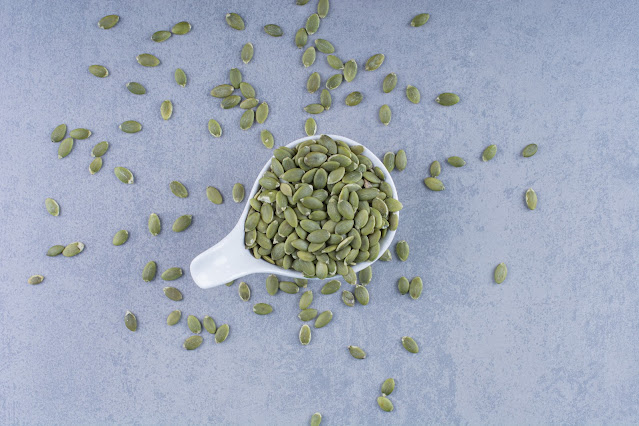Pumpkin seeds are tiny, flat seeds with a subtle nutty flavor, packed with impressive health benefits and nutrients. Also known as "pepitas," they are harvested from pumpkins and offer a variety of nutrients like protein, healthy fats, vitamins, and minerals, making them a nutritious snack and ingredient for health-conscious individuals. This article explores the nutritional profile of pumpkin seeds, their health benefits, and how you can incorporate them into your daily diet.
Nutritional Profile of Pumpkin Seeds
Pumpkin seeds are loaded with essential nutrients in every small serving. Here’s what you get from just one ounce (about 28 grams) of shelled pumpkin seeds:
- Calories: Approximately 150 kcal
- Protein: 7 grams
- Fiber: 1.7 grams
- Fat: 13 grams (mainly healthy fats)
- Carbohydrates: 5 grams
Vitamins and Minerals:
- Magnesium: 37% of the recommended daily intake (RDI)
- Phosphorus: 33% of the RDI
- Iron: 23% of the RDI
- Zinc: 14% of the RDI
- Manganese: 42% of the RDI
- Copper, potassium, and several B vitamins
Pumpkin seeds are rich in antioxidants, including vitamin E, and provide a good source of polyunsaturated and monounsaturated fats.
Health Benefits of Pumpkin Seeds
Due to their dense nutritional profile, pumpkin seeds have been studied extensively for their health benefits. Here are some of the most notable ones:
1. Heart Health
Pumpkin seeds contain high levels of magnesium, which helps maintain normal heart rhythm, supports blood pressure control, and reduces the risk of heart disease. The seeds' antioxidant properties, along with healthy fats, contribute to improved cardiovascular health.
2. Promotes Restful Sleep
Pumpkin seeds contain tryptophan, an amino acid that is a precursor to serotonin and melatonin, both of which are essential for quality sleep. Consuming pumpkin seeds, especially in the evening, may help improve sleep quality.
3. Improves Prostate and Bladder Health
Pumpkin seeds are beneficial for prostate and bladder health, especially in men. Studies suggest that pumpkin seed oil may reduce symptoms of benign prostatic hyperplasia (BPH), a condition in which the prostate enlarges and causes urinary issues. Additionally, the high zinc content supports male reproductive health.
4. Rich in Antioxidants
Pumpkin seeds are abundant in antioxidants, including vitamin E and carotenoids, which protect cells from oxidative damage. Antioxidants help reduce inflammation in the body, lower the risk of chronic diseases, and promote healthy aging.
5. Supports Bone Health
With a high magnesium and phosphorus content, pumpkin seeds play an important role in bone health. Magnesium is essential for bone formation and maintaining bone density, while phosphorus is a major component of bone structure.
6. Helps Regulate Blood Sugar Levels
Studies indicate that pumpkin seeds can positively affect blood sugar levels due to their low carbohydrate content and high levels of fiber, protein, and healthy fats. These properties make them a suitable snack for those managing diabetes or trying to stabilize blood sugar levels.
7. Boosts Immune System
Pumpkin seeds are a good source of zinc, a mineral essential for immune function, wound healing, and cell growth. Adequate zinc intake helps the body fend off infections, especially during cold and flu seasons.
8. Reduces Risk of Certain Cancers
Some research has found that diets high in pumpkin seeds are associated with a reduced risk of certain cancers, including breast and prostate cancers. The lignans and antioxidants in pumpkin seeds are thought to contribute to their anti-cancer effects.
How to Incorporate Pumpkin Seeds into Your Diet
Adding pumpkin seeds to your diet is simple and versatile. Here are some tasty ways to enjoy them:
- Roasted as a Snack: Roast pumpkin seeds with a dash of olive oil and a sprinkle of salt, or add spices like paprika or garlic powder for a flavorful snack.
- Topping for Salads and Soups: Sprinkle pumpkin seeds on salads, soups, or stews to add a crunchy texture and boost the nutritional content.
- In Smoothies: Blend a handful of pumpkin seeds into your smoothie for added protein, fiber, and healthy fats.
- Baking: Add pumpkin seeds to homemade bread, muffins, or granola bars for extra flavor and nutrition.
- Pumpkin Seed Butter: Like peanut butter or almond butter, pumpkin seed butter is a delicious spread for toast or a nutritious addition to smoothies.
- Trail Mix: Combine pumpkin seeds with nuts, dried fruits, and a few dark chocolate chips for a healthy, energy-boosting trail mix.
How to Prepare Pumpkin Seeds at Home
You can prepare pumpkin seeds at home by following these steps:
- Harvest the Seeds: Scoop out the seeds from a pumpkin, separating them from the pulp.
- Rinse and Dry: Rinse the seeds thoroughly under cold water, then pat them dry with a towel.
- Season and Roast: Toss the seeds with a bit of oil and seasonings (salt, pepper, or your favorite spices) and roast them in the oven at 350°F (175°C) for 10-15 minutes, stirring occasionally until they are golden brown.
Potential Side Effects of Pumpkin Seeds
While pumpkin seeds are generally safe and nutritious, consuming them in excessive amounts may lead to minor side effects:
- Digestive Issues: Due to their fiber content, eating large quantities of pumpkin seeds may cause gas or bloating in some people.
- Caloric Intake: Pumpkin seeds are calorie-dense, so moderate portions are recommended, especially if you’re watching your calorie intake.









%20Causes,%20Symptoms,%20and%20Treatment.jpg)

